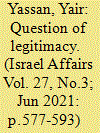|
|
|
Sort Order |
|
|
|
Items / Page
|
|
|
|
|
|
|
| Srl | Item |
| 1 |
ID:
178312


|
|
|
|
|
| Summary/Abstract |
Many members of minority groups clash violently with state agents. The case of West Bank rightwing activists is particularly paradoxical. Unlike disempowered groups whose ability to bring about change is limited, these activists constitute a powerful sociopolitical force, and the security forces with which they clash also protect them in the territories to which they claim sovereignty. Based on 20 interviews with rightwing protest activists, this article explores what interpretation activists give to their part in violent clashes. The article offers two main contributions. First, it proposes the concept of perceived state legitimacy as a theoretical construct for evaluating the degree to which citizens view their state as legitimate. Unlike previous studies that define legitimacy as a unidimensional construct, perceived state legitimacy is defined here as made up of five different components: identification, trust, distributive justice, procedural justice, and legality. Second, the article shows empirically that violent clashes can indicate undermining distinct components of state legitimacy. Thus, West Bank rightwing activists who took part in violent clashes with state agents undermine the state’s legitimacy components of trust, distributive justice, procedural justice, and legality – but not identification.
|
|
|
|
|
|
|
|
|
|
|
|
|
|
|
|
| 2 |
ID:
123957


|
|
|
|
|
| Publication |
2013.
|
| Summary/Abstract |
Given its religious demography, sub-Saharan Africa seems particularly prone to the outbreak of violent clashes between Christians and Muslims. This article compares three sub-Saharan countries-Nigeria, Côte d'Ivoire, and Tanzania-that display different levels of inter-religious violence despite each having in common similar population ratios of Christians and Muslims, as well as all sharing a number of the classical risk factors for conflict onset. The analysis of these three case studies shows that higher levels of inter-religious violence result from horizontal inequalities and overlapping religious and ethnic group boundaries that, in the context of tense political transformation, consequently breed inter-religious grievances and violence. When theological ideas become politicized, inter-religious violence reaches its most intense level of expression.
|
|
|
|
|
|
|
|
|
|
|
|
|
|
|
|
|
|
|
|
|